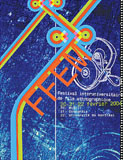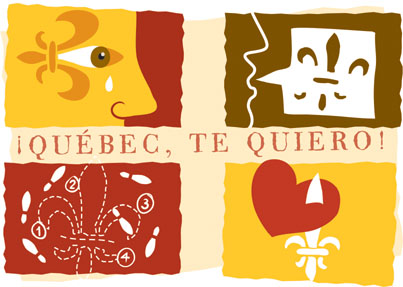Off campus
Screening

Anthropology students at three universities are putting together an Interuniversity Ethnographic Film Festival of Montreal (FFEM, in its French translation). The fest is intended to get both the general and academic public interested in ethnographic films, and the filmmakers will be present for discussion after each presentation. For the McGill screenings on Friday Feb. 20, see On Campus, page 15.
Topics are as diverse as tavern culture in contemporary Montreal, the effect of political change on social dance in Cuba, Mexican funerary practices, employee-boss relations in Quebec and America, the political situation in Western China, veiled women in Yemen, and the transformation of Romania's national symbol.
For detailed information, go to www.anthro.umontreal.ca/-varia/festival04. Events will take place on Saturday, February 21 at Concordia University, from 12:30 pm until 10:00 pm, at J.A de Sève Cinema, 1400 de Maisonneuve Boul. LB-123-125; and on Sunday, February 22 at the Universitv of Montreal, Pavillon Lionel-Groulx, 3150 rue Jean-Brillant, rm. C-3061, from 12:30 pm until 10:30 pm.
Browsing

Will hipster cow Moopheus reveal to cheery pig Leo the reality of modern-day corporate food production? Watch Leo take the red pill and discover his pastoral farm home is all a fantasy at www.themeatrix.com. With Lent coming up, you may be thinking the least you can do is eat more responsibly, and this website helps you learn more about factory farming. Go the the featured international action links to find out about Canadian grocers who sell organic goods and humanely raised animal products.
The broken promise

Tzigane
Language policy expert James Archibald, McGill's director of Translation Studies, explains why Quebec must do more to help immigrants
Dear Dr. Archibald,
It was in the fall of 2000 — that is, in May, since our seasons in Argentina are the opposite of yours. I had just come back to Buenos Aires from a couple of years in the States, where I earned my master's degree in electrical engineering. My wife and I were full of enthusiasm: Our marriage was strong despite the trying student years with three children to support, but we were young — relatively speaking — and ready to start out building a new life as young professional porteños in possibly the most exciting city in South America. Convinced that a professional engineer with a good working knowledge of both Spanish and English, coupled with a solid South and North American education, could be a player on the global stage, I was looking around for opportunities that would allow me to use all my professional skills in international development projects.
It so happened that the Premier of Quebec, Lucien Bouchard, and some of his ministers had put together a team of Quebecers who were on tour in Argentina and Chile in order to drum up business. Remember how Quebec was trying to position itself in the FTAA negotiations? Fascinating! A place with a "Latin" culture sitting on the border of the U.S. with tremendous potential for development — domestically and internationally — and with experience and expertise in electrical engineering. What a fit!
I didn't really think much more about it, until that is, we lost parity with the U.S. dollar. Our national debt exploded, and our personal savings in the country were either blocked or evaporated all together. Our buying power shrank on a daily basis, and my wife and I had to scrounge to keep food on the table. Imagine the reaction of an optimistic young professional with four children to support! The international development project I was looking for in 2000 suddenly became my personal project. I began looking at my options.
Going back to the States wasn't in the cards. Then I recalled the meeting between some Quebec officials and a group of professional engineers back in 2000. So, I called up the Quebec Government Office, which had opened its doors in my country in 2000, and made an appointment with the chargé d'affaires in order to discuss my chances of making a successful move to Quebec.
At the appointed hour I showed up at Quebec's beautifully decorated offices in the Edificio Laminar Plaza in Buenos Aires and received all the information I needed on how to apply and obtain my certificate of acceptance from Quebec and eventually my immigration visa from Canada. I walked away from the meeting feeling that I had made the right decision for my wife, my children and myself, and that we would be able to start a new life in Quebec under the best of conditions. My wife and I would get 1,000 hours of French instruction to bring us up to speed; my children would be welcomed into special classes so that in a short time they would be able to move into the regular stream; meetings would be set up with the Quebec Order of Engineers so I could begin to rebuild my professional life as soon as possible. We were encouraged to consider establishing ourselves in one of Quebec's developing regions, which, according to all reports, had good prospects for the future.
Here we are now in 2004! Instead of the 1,000 hours of French, I only received 200, and I was put in class of "survival French" for refugees. Hardly what I needed to function at a professional level! Since language competence is part of professional competence under Quebec law, I was unable to get an engineer's license. I am a paper salesman now. My professional dreams began to evaporate like my bank account in Argentina. Instead of being supported in their integration into the school system, my children were placed in classes for those with learning disabilities, but they are not challenged intellectually. If they had the proper level of French, they would be at the top of their classes just like back home.
Don't get me wrong. I have come to love Quebec and its people. It's a beautiful place. But when I think back to that first meeting with the chargé d'affaires, I can't help but wonder if he and the government behind him had done their homework. You cannot integrate and retain immigrants like us unless you are willing to make the necessary commitments to education, professional integration and the general social and economic well-being of new Quebecers. Right now, we are once again looking at our options. Toronto and B.C. are high on the list.
Mario Daniel Gómez
Mario Daniel Gómez is not his real name, but his case is real. And he is not alone.
Since the signing of the Cullen-Couture Agreement in 1978, Quebec has assumed increasing responsibilities in the area of immigration. Through a recruitment and selection program that has met its objectives in terms of the number of immigrants "landed" in Quebec, successive governments have structured a relatively efficient system of socio-economic and lingusitic integration. Yet, since the election of the new Liberal government, there seems to be a consensus in government circles that Quebec can do better. Indeed it can!
Michelle Courchesne, the current minister in charge of immigration policy, thinks so too, and she feels that it is a question of utmost urgency if Quebec is to meet the challenges of an aging population, a low birth rate and a pressing need to renew the professional workforce by integrating qualified young people.
In our brief1 to the Commission on Culture at the National Assembly, which is examining Quebec's immigration policy, we have recommended upgrading the infrastructure to support the francization of non–French-speaking immigrants, adopting internationally recognized standards in determining professional-level competence in French and reviewing the equivalency regulations in Quebec's professional bodies and educational institutions, in order to guarantee greater transparency in the process and to avoid the ad hoc decision-making that has plagued the system over the last few years.
I hope the government will listen to the voices of people like Mario Daniel Gómez and will not continue to break its promises. That way the Mario Daniels whom we have worked so hard to attract to Quebec will be able to stay and to improve their lives and ours as well.
1. Archibald, J. Pour une francisation accrue et une meilleure intégration des migrants. Québec: Commission de la Culture, Assemblée nationale du Québec, 2004.
